Nine+ Innings of Baseball Flicks

Top of the first: The Sandlot (1993)
It’s May, and a fan’s thoughts turn to baseball. Here’s the first of a full nine innings of baseball film. We start with The Sandlot, which most current MLB players (many of whom were just the right age when the film was released in 1993 or later available on video) will cite as their favorite baseball movie. A coming of age film often compared to the earlier classic Stand By Me, baseball is the glue that cements the team of not-all-talented misfits, showing the bonding that can ensue, regardless of shape, size, skin color, or age. Haven’t seen it yet? You’re killing’ me, Smalls.Top of the second: A League of Their Own (1992)
Everybody remembers the Tom Hanks line from the movie, “There’s no crying in baseball” — not true, by the way, I’ve seen lots of MLB players cry, although mostly when good stuff happens — but it’s girl power that makes this portrayal of 1940s AAGPBL ballplayers a real winner. Director Penny Marshall included demonstrating baseball skills in auditions, and actresses Geena Davis, Rosie O’Donnell, Lori Petty, Megan Cavanaugh, and Madonna went all-out for their roles as Rockford Peaches. 2017 marks the 25th anniversary of the film’s release; in addition to a new DVD/Blue-Ray release, the Bentonville Film Festival this month celebrates the film with a screening and softball game featuring Davis and other actresses from the film. Interviewed for the anniversary, Davis, whose Geena Davis Institute for Gender in Media hosts the film festival and champions women and diversity in all aspects of entertainment media, said, “[I realized] I would rather play baseball than be the girlfriend of the man playing baseball, and that’s the operating principle that’s pushed me ever since.”
Top of the third: Field of Dreams (1989)
Kevin Costner has practically made a career of being cast in baseball movies, this being one of the most popular. Based on one of my favorite books, Shoeless Joe by W. P. Kinsella (who gets about as close to magical realism as is possible for a North American writer), it’s a sentimental but often effective nostalgia-filled capsule of (mostly masculine) relationship issues, seen via the American pastime. It has generally good casting (although Ray Liotta couldn’t master batting left-handed in his portrayal of Joe Jackson). I like this synopsis from The Hollywood Reporter’s review:
No matter what side of the plate you're hitting from, it’s obvious that writer-director Phil Alden Robinson has a sure-gripped story arsenal of breaking stuff and slow floaters. Both good and bad for veteran moviegoers, it’s possible to see the very seam on Robinson’s narrative pitches — many of them delivered out of a straight-on Spielbergian windup, with a few off-speed ’60s spitters for perspective.
Read the book.
Top of the fourth: Major League (1989)
Wild, raunchy, and tons of fun, this is the fave film choice for pro baseball players who don’t cite The Sandlot. It features some actors with fewer baseball skills than the previous two films I’ve discussed so far, although Charlie Sheen could really pitch (up to 150 pitches a day, for some scenes!), Dennis Haysbert hit home runs whenever called for in the script, and Wesley Snipes DID make that home run saving catch in the final game. Also, at least according to Sheen, the film introduced playing warm-up music for relief pitchers with its use of the Troggs’ “Wild Thing.” In a life-imitates-art moment, the Cleveland Indians DID sacrifice a chicken to Jobu during the 2016 season to break Yan Gomes out of his slump. Finally: Bob Uecker!
Skip the sequel, though.
Top of the fifth: Damn Yankees (1958)
They just don’t make baseball musicals any more (except in Japan: more on that later!), so we have to go back to 1958 for the film adaptation of the Broadway musical Damn Yankees, based on Douglass Wallop’s novel The Year the Yankees Lost the Pennant (and, uh, Faust). Frustrated Senator fan Joe Boyd vows to sell his soul to the devil to see his team beat the Yankees, and gets his wish, in spades. Appearing in the guise of a conman named Applegate, the devil restores Joe’s youth as the powerhouse talent Joe Hardy, so that he can personally be his team’s savior. Hijinks ensue, with Applegate’s right-hand gal Lola enlisted to seduce and corrupt young Joe and create demonic chaos. Ray Walston is slyly perfect as Applegate, Gwen Verdon hot hot hot as Lola, and Tab Hunter charming as the innocent young ballplayer. There’s more fancy footwork off the field than on, but the film is an energetic and funny ode to our national pastime.
Top of the sixth: The Natural (1984)
If, as film critic Carrie Rickey noted, Damn Yankees is baseball’s Faust, then The Natural is its Parsifal. Bernard Malamud’s 1952 novel, on which the film is purportedly based, is a dark masterpiece of Americana freely mixing Homeric and Arthurian metaphors with those of baseball mythology, evoking Excalibur, Odysseus, the Fisher King, and the epic hero’s journey through the lens of baseball folklore including Joe Jackson’s named bat, the shooting of Eddie Waitkus by a crazed fan, game-winning home runs, and second chances at glory. Unfortunately, the film adaptation trades complex mythic resonance for sentimental redemption, with depictions of characters who are as purely black or white as the clothing worn by the women who serve mainly as symbols. The cinematography is gorgeous, the score stirring, the sets historically nostalgic. But I wanted to see less of Robert Redford in movie star mode, and more of Wilfrid Brimley and Richard Farnsworth agonizing in the dugout.
Top of the seventh: The Unnatural (1999)
David Duchovny pens and directs one of the finest episodes of The X-Files, told in flashbacks to New Mexico in 1947, where a talented black member of the Roswell Grays finds himself targeted by the KKK while underplaying to avoid being scouted by the Yankees. This being the X-Files, Josh Exley is actually an alien, forbidden to interact with humans but hiding in disguise after he fell in love with baseball. Exley is based on Negro League phenom Josh Gibson, whose jersey Mulder wears when he takes his partner to the batting cages and teaches her how to hit. Fun trivia: Dana Scully is named for Vin Scully, who recorded his part as a baseball announcer in an archival scene for free. Allusions are also made to ET and MacGyver, as well as to Malamud’s novel. The episode’s tag line: In The Big Inning.
Seventh inning stretch: Take Me Out to the Ballgame (1949)
Harking back to the days when professional baseball players needed jobs in the off-season (well, OK, that lasted until the 1960s), turn of the 20th century ballplayers Gene Kelly and Frank Sinatra moonlight in vaudeville until spring training starts. Finding out that the new owner of the Wolves is Esther Williams leads to an adjustment period, romance, and gambling intrigue, as well as song and dance numbers. Although Kelly is supposed to have claimed that he never wanted to be a dancer, but a shortstop for the Pittsburgh Pirates, there is very little footwork on the diamond in this pleasant but nondescript Busby Berkeley musical.
Top of the eighth: Eight Men out (1988)
1988 was a darn good year for baseball movies, producing two films widely considered the best ever made (and my two favorites). John Sayles’ screenplay for Eight Men Out, based on Eliot Asinof’s 1963 book about the notorious 1919 Black Sox scandal, was the first screenplay Sayles ever wrote, and it took him eleven years to film it. A dream cast of young talent — athletic as well as dramatic — includes several actors who played ball in high school and college. D.B. Sweeney, who played Joe Jackson, learned to bat left-handed during a two month stint playing with the A league Kenosha Twins before the shoot, at his own expense. Sweeney convinced Charlie Sheen, an experienced ballplayer who went on to portray pitcher Rick “Wild Thing” Vaughn in two Major League movies, to join the project without reading the script during a conversation in McSorley’s Old Ale House in Manhattan [well worth a pilgrimage!]. John Cusack (Buck Weaver) and David Straithairn (pitcher Eddie Cicotte) are particularly memorable in personifying the struggle between idealism and betrayal that all of the team members suffered. Jim Hemphill of Filmmaker Magazine calls Sayles "the greatest living cinematic chronicler of 20th-century America," a master of presenting a truthful and compassionate perspective on the human condition through inspired ensemble casting and small budget film wizardry. Eight Men Out does a lot to support this assertion; it’s as relevant today as the narrative was back in 1919.
Top of the ninth: Bull Durham (1988)
From 1967 through 1971, writer/director Ron Shelton lived the minor league life as an infielder in the Baltimore Orioles organization. When he eventually moved on to Hollywood, the story he had to tell turned minor league baseball into a growth industry for small towns and suburbs across the country. Bull Durham is also a damn good movie, about baseball, about sex, about real people living life, about the value of experience. Unlike most sports movies that are usually too reverential, this film has the virtues that Annie Savoy, Susan Sarandon’s character, says all good hitters must have: it’s concentrated and relaxed. The cast is uniformly excellent, from Sarandon’s knowing baseball muse/Boswell to Kevin Costner’s savvy but world-weary catcher Crash Davis to Tim Robbins as the talented-but-wild naive pitcher Nuke LaLoosh to all of the supporting cast members, all creating quirky, funny, and realistic characters. This is my absolute favorite baseball film. If I were to adhere to any religion (not likely), it would be the Church of Baseball. And that scene with the famous conference on the mound? Totally realistic, based on my experience catching for the Intoxicators.
Extra innings: Battlefield Baseball / Jigoku Kôshien (2003)
Free baseball: when stuff can really get weird. Nothing’s weirder than this Japanese baseball horror comedy musical based on a popular manga by Gatarô Man and adapted by Yudai Yamaguchi, a veteran member of cult director Ryuhei Kitamura’s filmmaking team. Baseball is the school sport of choice in Japan, so young athletes dreaming of making it to the national high school tournament can relate to Seido High’s fanatical coach and motley assortment of baseball players. Unlike most sports rivalries, however, the rival Gedo team members have already died training and their ranks have swelled with zombies, armed to the teeth with instruments sharper than baseball bats. It’s up to Judeh the Baseball (Tak Sakaguchi, another Kitamura regular), a local loner whose baseball skills are so extreme he dropped out of society after accidentally killing his father during pitching practice, to lead Seido to victory. This is not a film for everyone, but if you are in the mood for delirious send-ups of sports movie clichés and soap opera histrionics and don’t mind a bit of splatter, check it out.

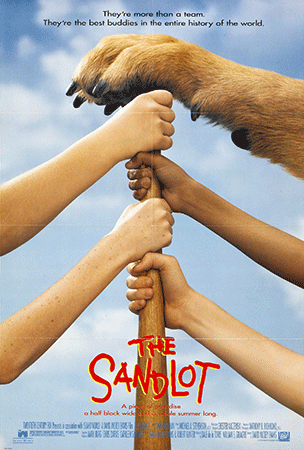
The Sandlot

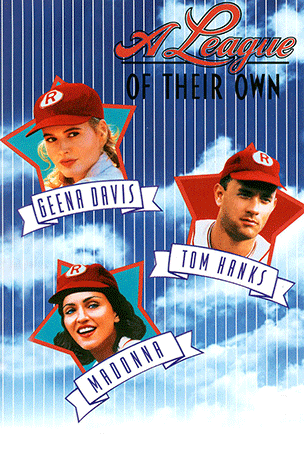
A League of Their Own

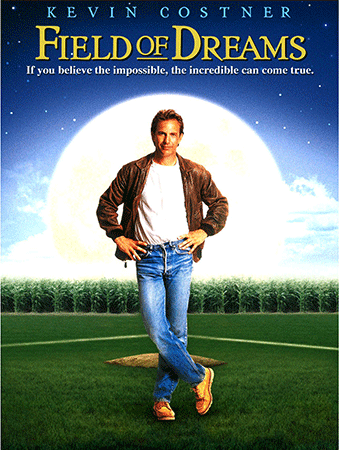
Field of Dreams

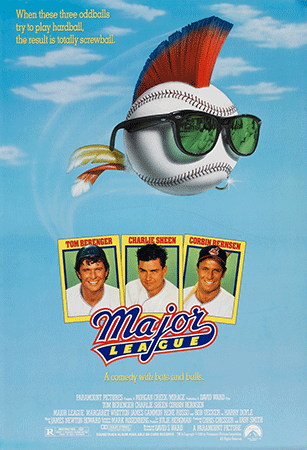
Major League

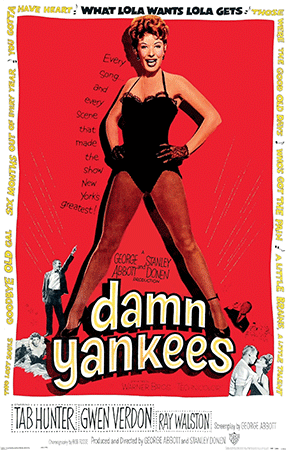
Damn Yankees


The Natural

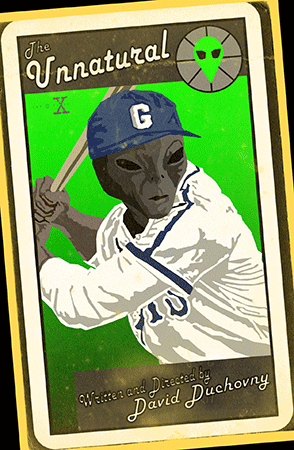
The Unnatural

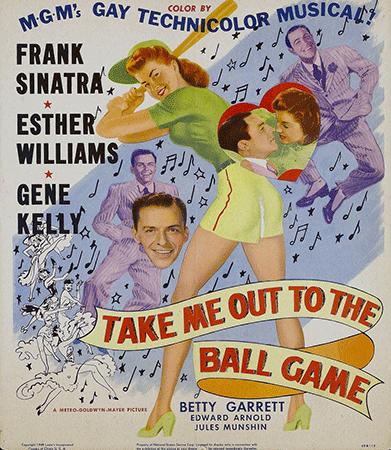
Take Me Out to the Ballgame

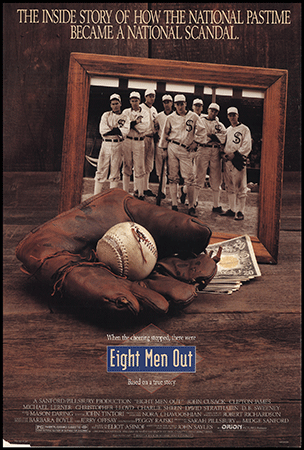
Eight Men Out

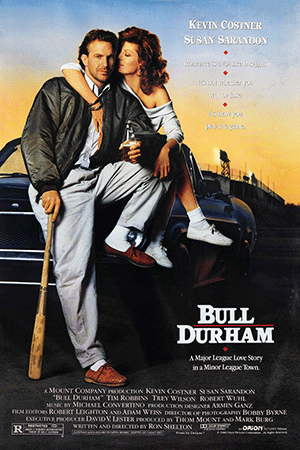
Bull Durham

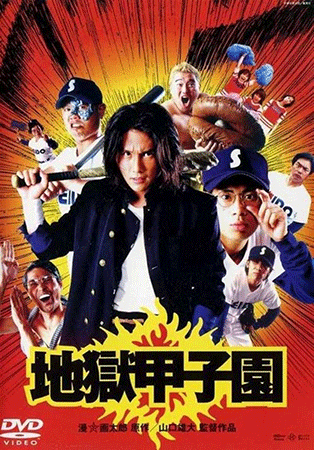
Battlefield Baseball
Bench players
(some other films worth checking out, in alphabetical order)- Angels in the Outfield (1951, 1994)
- The Bad News Bears (1976, 2005)
- Bang the Drum Slowly (1973)
- Fear Strikes Out (1957)
- Fever Pitch (2005)
- For Love of the Game (1999)
- 42 (2013)
- Moneyball (2011)
- The Pride of the Yankees (1942)
- The Rookie (2002)
References
Overview
For completists: a checklist of every movie featuring baseballEverybody has a list of the best baseball films:
Best Sports Movies.comYou can add your own rankings to this crowd-sourced compilation:
Consequence of Sound
Indiewire
New York Post
Ranker.com: All-time Best Baseball Films
Individual Films
The Atlantic: The Best Baseball Movie Ever? Bull DurhamThe Ringer: Major League Is Baseball
Review: The Unnatural
Midnight Eye Review: Battlefield Baseball
Sports on Earth: Bull Durham, 25 Years Later
The Hollywood Reporter Review: Field of Dreams
New York Times Review: Damn Yankees
Consequence of Sound: A Hero’s Ending: Why Robert Redford Didn’t Strike Out
Three Movie Buffs Review: Take Me Out to the Ball Game
General References
All American Girls Professional Baseball League (AAGPBL)The National Pastime Museum: Eight Men Out by Eliot Asinof

